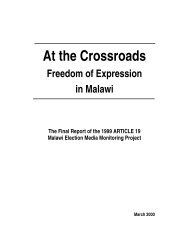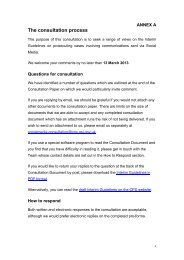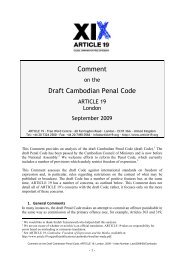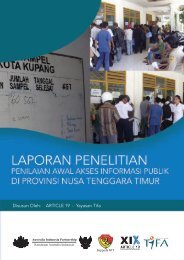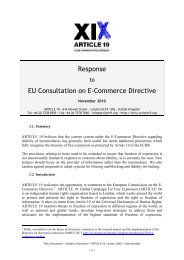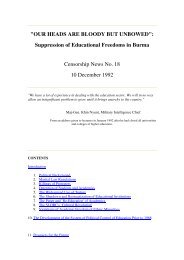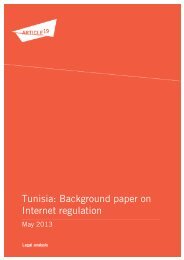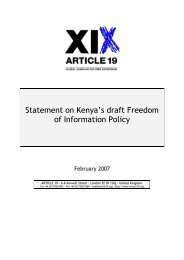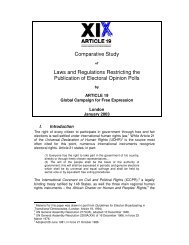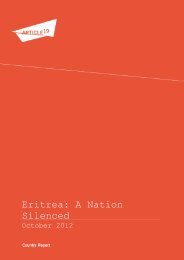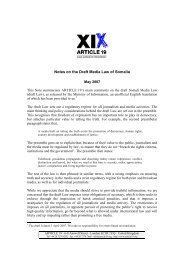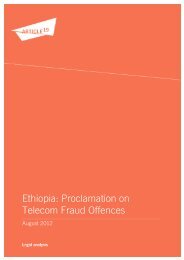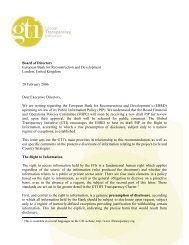FOR INTERNAL USE ONLY - Article 19
FOR INTERNAL USE ONLY - Article 19
FOR INTERNAL USE ONLY - Article 19
- No tags were found...
Create successful ePaper yourself
Turn your PDF publications into a flip-book with our unique Google optimized e-Paper software.
ARTICLE <strong>19</strong>GLOBAL CAMPAIGN <strong>FOR</strong> FREE EXPRESSIONThe conclusions of public EIAs can (but do not have to) be publicised in the media and sent tothe relevant local organs of the MEP, including bodies responsible for State EIAs. This data can betaken into account while carrying out the State EIA (<strong>Article</strong> 42).According to <strong>Article</strong> 11 of the EIA Law, public hearings and open sessions should beconducted in order to take public opinion into consideration in EIA processes. Public participation inthis area can also be facilitated through statements in the media, the submission of writtenrecommendations and the participation of public representatives in EIA expert committees. <strong>Article</strong> 11further states that the formulation of conclusions on EIAs and the subsequent decision-making on therealisation of projects has to take public opinion into consideration.Legal entities can challenge the results of EIAs – either directly with the State bodiesresponsible for the decision or by lodging a legal appeal (<strong>Article</strong> 44).4,( <strong>Article</strong> 47 of the Law on Information states that ‘breaches of the law … shall entail disciplinary, civillaw and administrative liabilities, as well as criminal prosecution’. This provision can be applied incases of illegitimate denial of information; untimely release of information; dissemination ofmisleading information; and obstruction of dissemination of information.<strong>Article</strong> 238 of the Criminal Code provides for fines or imprisonment in case of:Concealment or intentional tampering by an official with information concerning the environment,including radiation levels, in connection with pollution of land, water, air, food products and rawmaterials, and all that adversely affects the health of people, flora and fauna, and also the incidence ofdisease among the population in areas of heightened environmental threat.The maximum penalty is three years’ imprisonment, or five if the information relates to an emergencyarea and its concealment leads to grave consequences. ARTICLE <strong>19</strong> is not aware of cases in whichthese provisions have been applied.Amendments in 2003 <strong>19</strong>9 added a provision to the Code of Administrative Offences, on theillegitimate refusal of information, its late or incomplete provision, or the provision of falseinformation by public officials. These offences are punishable by a fine.In practice, sanctions are not applied. If a court rules in favour of an information requester, thebody holding the information is simply requested to release it, without the imposition of sanctions.The complexity of the legislation also deters many potential plaintiffs from taking cases against public<strong>19</strong>9Law ‘On the Insertion of Changes to Certain Laws of Ukraine to Support the Right to Freedom of Speech’,see note 10.For Internal Use Only. Is Post-Chornobyl Ukraine Ready for Access to Environmental Information?ARTICLE <strong>19</strong>, London, 2007%(



